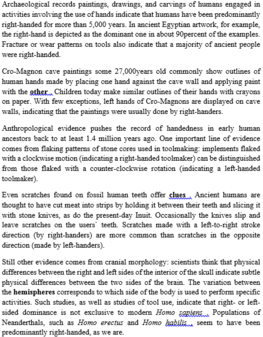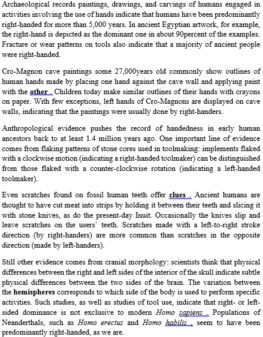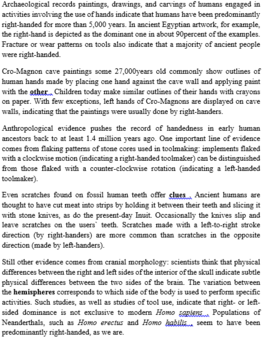Read the following passage and mark the letter A, B, C, or D on your answer sheet to indicate the correct answer to each of the questions from 36 to 45.
PHOBIAS CONTROL THE EYES
People with an overpowering fear of something may not be able to consciously control the direction of their gaze when faced with a picture that provokes that fear. Those with a fear of spiders, or arachnophobia, may not be able to avoid looking toward a spider in the grass, while those without the fear can. To reach this finding, 26 college students - half of whom had arachnophobia - were outfitted with a device that tracks eye movements. The participants were then shown a four-by-four grid of flowers on a computer screen, where a picture of a grey-brown spider and a grey-brown mushroom each occupied one space on the grid.
In one trial, the students were asked to press the spacebar when they spotted a mushroom, but to ignore any spiders. In a second, the students were asked to press the key when they saw the spider, but to avoid looking at mushrooms. When instructed to ignore the spider and spot the mushroom, the students with arachnophobia could not avoid looking at the spider - causing them to notice the mushroom three-tenths of a second more slowly than the control group. Additionally, when the students were asked to search for the spider, the arachnophobic students found the spider and pressed the space bar about three-tenths of a second more quickly than the non-phobic students.
These findings show that the attention processes of people with a powerful fear of spiders may be beyond their conscious control. This suggests that treatments that focus on conscious thought processes may not work for such phobias. Instead, therapists could focus on treatments such as systematic desensitization.
What is the purpose of the passage?
A. to prove that phobias are a myth
B. to help people with phobias
C. to relate research findings about phobias affecting eye control
D. to relate research findings about phobias controlling eyesight






Đáp án là C.
Dựa vào đoạn cuối trong bài: ... Instead, therapists could focus on treatments such as systematic desensitization.